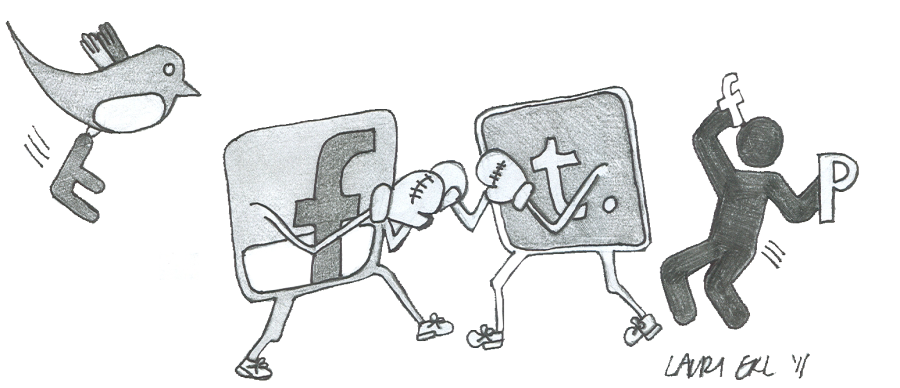Social networking has become a part of almost everyone’s life. In fact, about 93 percent of teens aged 12-17 go online, according to Top Ten Reviews.
Teachers have also begun to catch onto social networking. Julie Bryniczka, girls’ lacrosse coach, and Peter Kupfer, physics teacher, use Twitter and Facebook to communicate information with their students and players.
“I post updates on practice times, locations, and last minute reminders. Lacrosse is unpredictable. The schedule is never really consistent, so things change all the time. [Twitter] is extremely beneficial,” Bryniczka said.
Unlike Bryniczka, Kupfer uses Twitter and Facebook as a reminder for students.
“I post homework assignments and pictures of things we do in class,” Kupfer said. “The [students] that use [Facebook/Twitter] get a reminder at 5:30 every day.”
According to Bryniczka, Twitter is useful to her players, in a sense that tweets are a way to “instantaneously communicate since everyone has a phone, and parents can be updated, too.”
Although Bryniczka and Kupfer use social media for educational reasons, teens mainly use it for non-educational purposes. LZ Students, Cynthia Stebbins, Erika Smolyar, Jessica Szabla, and Daniel Park all agree: It’s a simple way to stay connected with your friends. But since they all have the same idea, what makes the sites so different from each other?
Facebook:
Facebook includes wall posts, photo albums, commenting on almost everything a user does, and relationship statuses. Facebook’s new changes now include a “ticker” that shows what your friends are doing at that exact moment on Facebook.
FriendProject:
FriendProject is exactly like the 2006 MySpace. There are journal posts, statuses, and the same messaging system as MySpace (in the inbox, if the messages have been replied many times, there will be many “Re:’s”). The user can also design his or her profile the way he or she would like.
Tumblr:
Tumblr is a blogging site mostly based on people reblogging (clicking a button to repost content a person’s blog onto his or her own blog) pictures, videos, and text posts from their dashboard (Tumblr’s equivalent to Facebook’s newsfeed). The user can customize his or her profile the way he or she would like. Instead of being “friends” with someone, a user “follows” another person.
Twitter:
Twitter is used more for verbal statuses than anything. Users send “tweets” that are 140 or fewer characters. Users can “retweet” other users’ tweets, as well as “like” the tweets. Like Tumblr, on Twitter a user “follows” another user.
| Why is it your favorite? | Why is it better than the rest? | What are its special features? | How often do you use it? | |
| Daniel Park, freshman: Facebook | “It keeps me in contact with my friends and helps me when I lose my phone.” | “Facebook is just better. It has more stuff to do than other sites. It’s just something to do on the computer.” | “You can play games [apps] on it and you can IM with your friends.” | “I use it about every other day.” |
| Cynthia Stebbins, sophomore: FriendProject | “It’s exactly how MySpace was, and I miss it.” | “Facebook is always updating; it’s confusing. Even MySpace changed, but FriendProject stays the same.” | “You can update your mood with a smiley, and you can do anything you want to your profile.” | “About every day.” |
| Jessica Szabla, sophomore: Tumblr | “I feel like I can customize it to make it like what I want. I can put anything on it, and I won’t be judged.” | “If you have a Facebook, everyone can see everything and your name. You’re private on [Tumblr], and it’s truly your own blog. [Tumblr] has more things I can relate to.” | “[Tumblr] has a follow button. You can reblog posts or videos. It’s actually a blog, and you can customize your page. You can also ask people questions.” | “Every day. I can reblog from my dashboard on my iPod.” |
| Erika Smolyar, junior: Twitter | “Basically, I get to express more emotion without having everyone on Facebook see it.” | “On Facebook, people judge your statuses, and there seems to be a lot of passive aggressiveness. People actually say what’ s on their mind on Twitter.” | “Tweets are the main thing. People spend more time thinking of tweets than statuses. Twitter has interesting things to read, and some are even funny.” | “I check it every day, multiple times.” |

